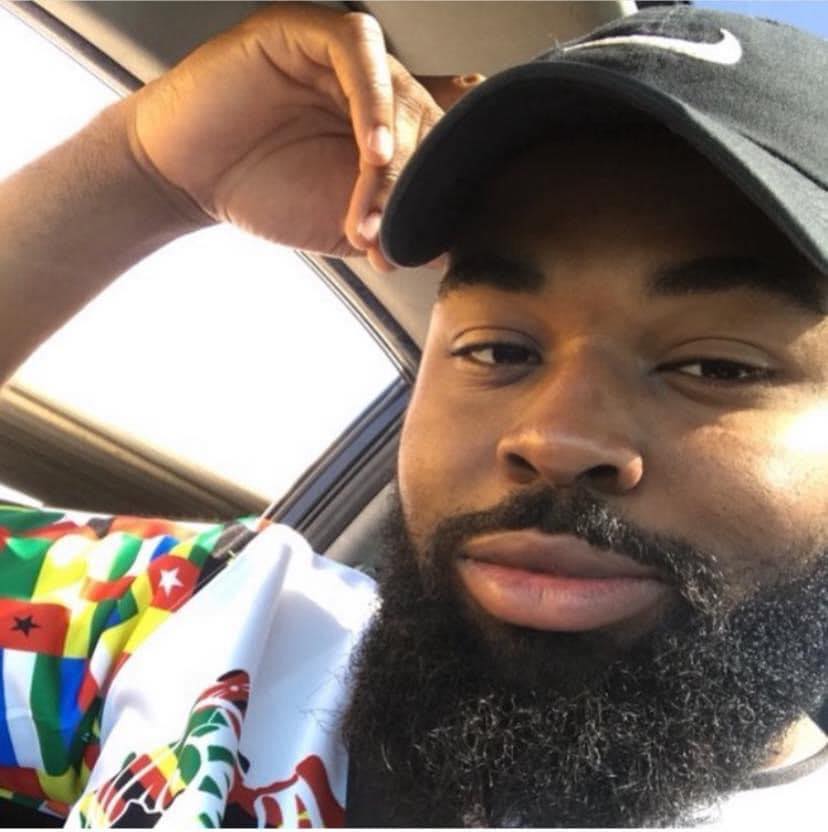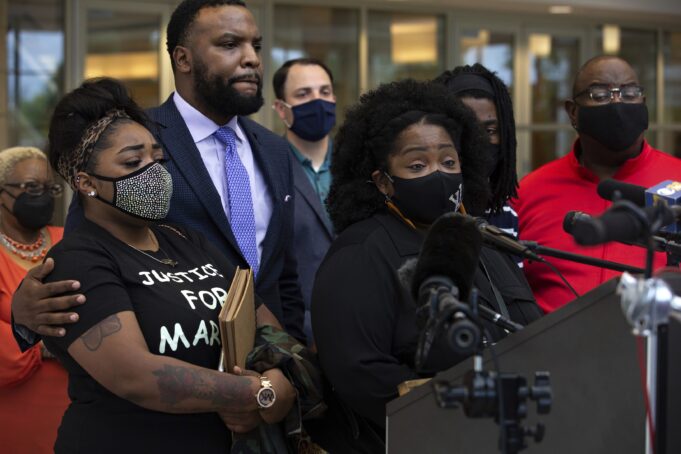“No justice, no peace! No justice, no peace!” The familiar slogan was chanted at a protest held after a Texas grand jury declined June 22 to indict eight detention officers in the death of 26-year-old Black man, Marvin Scott III.
Marvin Scott died on March 14 after being arrested in Allen, Texas, on a misdemeanor marijuana possession charge. At the time of the arrest, he had less than two ounces of marijuana on him, authorities said.
When Mr. Scott started behaving in what police described as a possible manic episode, he was taken to the hospital and later transported to Collin County Jail in McKinney, Texas. While at the jail, he again started exhibiting “strange” behavior. His family said he had schizophrenia.
The detention officers secured Mr. Scott to a restraint bed, sprayed him with pepper spray and placed a spit mask over his face. Collin County Sheriff Jim Skinner said he became unresponsive while he was being put on the restraint bed. He was then taken to the hospital, where he was pronounced dead.
Since his death in March, Mr. Scott’s family, including his mother, LaSandra Scott, and sister, LaChay Batts, have led many protests demanding justice. Their cries culminated in a grand jury’s decision made June 22 to not indict the eight officers: Blaise Mikulewicz, Austin Wong, Justin Patrick, Rafael Paredez, James Schoelen, Alec Diftta, Andres Cardenas and Christopher Windsor. Sheriff Skinner fired seven of the officers after the incident, and one resigned; one has since been reinstated.

After the ruling, the grand jury issued a statement, saying: “After careful consideration of the applicable law and all the relevant facts we find the no probable cause exists to charge any person with a criminal offense related to the death of Mr. Scott. Accordingly, we have issued a no bill for each of the eight detention officers involved. We would like to extend our deepest sympathy to the family and friends of Mr. Scott for the terrible loss you have suffered. We hope you can someday find peace.”
The jury recommended a work group to “study the events of March 14 for lessons learned in an effort to avoid any similar future tragedy.” They recommended the group consist of Collin County community leaders, criminal justice and law enforcement stakeholders, local hospitals and mental health providers.
“The goal of this work group should be finding the best solutions for the treatment of individuals with mental illness who come in contact with a criminal justice system,” the statement read.
The grand jury’s decision was made despite Collin County Medical Examiner William Rohr’s ruling that Mr. Scott died of homicide due to “fatal acute stress response in an individual with previously diagnosed schizophrenia during restraint struggle with law enforcement.”
“Marvin Scott’s family is extremely disappointed the GJ failed to bring charges in this case. The evidence (unreleased video, spit-hood, OC spray, policy violations & a ME conclusion of homicide, provides more than sufficient probable cause for indictments,” tweeted civil rights attorney Lee Merritt, who is representing the family.
“Marvin Scott’s family looks forward to review by a Federal Grand Jury of his in-custody death. The failure of prosecutors to secure indictments in this matter reflects a trend in Texas of undervaluing the lives of African American’s suffering mental health crisis,” he tweeted.
Attorney Pamela Muhammad, based in Texas, told The Final Call that if the prosecutors really wanted an indictment, they could have gotten it. What happened to Mr. Scott was horrible, she added.
“A grand jury is not going to give you a conviction. A grand jury is simply saying there’s enough here to charge you, and then we’ll let the process work itself out,” she said.
“To say that in these circumstances that there’s not enough evidence to even charge these people, where you have a dead person and you have excessive force and you have a violation of policies, that’s just not justice,” the attorney stated.
“This is what people are pointing at now, the violations and the extrajudicial killings, where these law enforcement officers are taking this into their own hands and not following policies,” she continued.
Atty. Muhammad pointed to the Derek Chauvin trial. The recently sentenced former Minneapolis police officer placed his knee on George Floyd’s neck, killing him. During the trial, it was stated that once someone is in your custody, their life is your responsibility.
“If he’s restrained, then what is the need to continue to use excessive force on him? There should only be enough force used to get them restrained and then the need to make sure that their safety—if he became unresponsive—then the safety of this man should have been foremost, and they should have taken the immediate steps to secure his life. Because once he’s in their custody, then that’s their responsibility to keep him alive,” Atty. Muhammad continued.
Mr. Scott’s family and their attorney, Lee Merritt, viewed security footage of what happened. They described it as “horrific” and said it looked like the officers did not help their loved one.
John Fullinwider, a longtime community organizer in Dallas and co-founder of Mothers Against Police Brutality, questioned why the video hasn’t been made public.
“They say they have video that they’re not releasing, but that’s because it shows that they killed, probably,” he told The Final Call. “I mean, it never turns out the other way, that they hold the video back and then it shows that the officers were perfectly in the right.”
He called it “unjust” to decline to have a trial.
Cheryl Smith, publisher of Texas Metro News, Garland Journal and iMessenger in the Dallas-area told The Final Call she was “disappointed but not surprised.” She said there needs to be oversight, a citizens police review board with subpoena power and that police officer settlements need to come out of their pensions.
Other factors in Mr. Scott’s case are the disproportionate rates at which Black people are arrested for marijuana and law enforcement mistreatment of those with mental illness.
“He was using [marijuana] to self-medicate after being two years diagnosed with schizophrenia,” Atty. Merritt told ABC News. “Here, in a largely White area (in Allen, Texas), Marvin stood out. He wasn’t even given the benefit of the doubt as someone who needed to go to a medical facility.”
According to a 2020 report by the American Civil Liberties Union, Black people are 3.73 times more likely to be arrested for having marijuana than White people, despite marijuana use being roughly equal among Blacks and Whites.
Mr. Fullinwider described the intersectionality of two crises present in Mr. Scott’s case: unaccountable police brutality and mental illness.
“Of course, both of those crises are racialized. In other words, the crisis falls hardest on Black people and particularly on Black men. So, this is a, you can’t even just call it a problem. Imagine if a cancer patient was routinely denied access to care, and when they demanded care, they were beaten and put in jail. Because that’s what happens to mentally ill people who are in effect demanding care with aberrant behavior,” he explained.
“It’s a crisis that just happens right in front of your eyes. And yet when the budget comes around, there’s never enough money to deal with this particular health crisis. You can’t expect to have a just society if you take every social problem and have the police be your cure of last resort, or first resort or only resort. And it’s really unconscionable.”
Mr. Fullinwider said, the case is very similar to a 2015 case that happened in Arlington Jail. McKinney, Texas is 31 miles from Dallas and 51 miles away from Fort Worth. Right between those areas is Arlington, Texas.
In 2015, police arrested a 42-year-old Black man, Jonathan Paul, who appeared to be in mental distress. After he clogged the toilet in his cell, police pepper sprayed him and dragged him to another cell, where he lay for 23 minutes without moving. He died three days later. The jailers were indicted, pleaded guilty and received one year of probation.
“Even though they did get indicted and pled guilty, they got one year probation, which is not a very big punishment for contributing to the death of a person in your care,” Mr. Fullinwider said.
In a Dallas case, 38-year-old Jason Harrison, a Black man who was both bipolar and schizophrenic, was shot within nine seconds of police arrival to his home. He had five gunshot wounds, two in the back.
“Nothing happened. No charges, no indictment, no trial, no conviction, no nothing. And those officers were back on the Dallas police force on patrol before Jason’s autopsy was even released,” Mr. Fullinwider said.
To show there were other options rather than killing these Black men with mental illnesses, the longtime activist described yet another incident. An elderly White man, Douglas Leguin, who lived at the edge of Dallas and Collin County, lit a fire in a vacant lot and then shot at the firemen when they arrived. When police were called and showed up on scene, he shot at police.
“Did they shoot him back in nine seconds? No. Did they send a SWAT team in to get him? No. Did they send a robot in there like they did with the guy in downtown Dallas? No. They negotiated with him for hours, four to five hours. They talked him down and he was in jail that night, giving jailhouse interviews about the ‘Kingdom of Dougiestan’ that he was going to establish on that vacant lot. And he’s alive today,” Mr. Fullinwider said.
He described the system as “rotten” and said there must be transformational change. One example he mentioned is in traffic control.
“You don’t need a gun to give a ticket, and that way you’re not going to have a traffic stop escalate to where somebody dies,” he said. He also advocated for the implementation of mental health and crisis intervention teams and programs.
Atty. Muhammad called out the collusion that sometimes happens between local and state law enforcement bodies. A March report by 12 legal experts from the Caribbean, Africa, Asia, Latin America and Europe, titled the “International Commission of Inquiry on Systemic Racist Police Violence Against People of African Descent in the United States,” found collusion between multiple law enforcement agencies in connection with police killings of Black people.
“The grand jury is a tool of the prosecution’s office. So therefore, many times it works hand in hand. When you see these non-indictments coming down, a lot of times the collusion, potentially, or the conflicts of interest that may exist between the office, the actual law enforcement and the prosecutorial office, it sometimes prevents us from getting a fair assessment,” the Texas attorney said.













